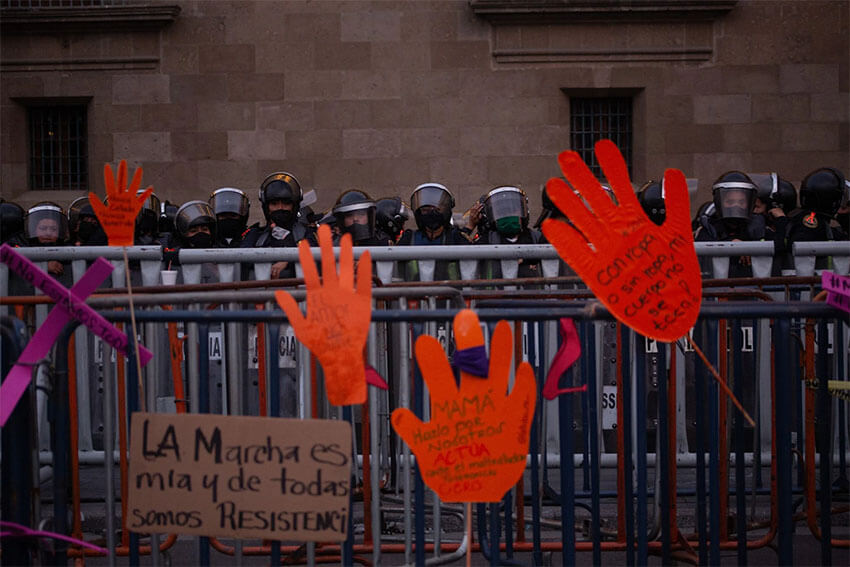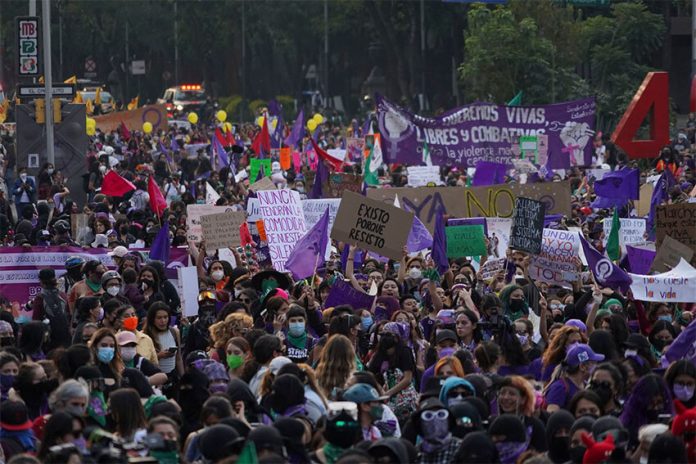Thousands of women and girls took to the nation’s streets on Thursday to protest against gender violence.
On International Day for the Elimination of Violence against Women, marches and/or rallies were held in numerous cities including Mexico City, Acapulco, Oaxaca, Chihuahua, Culiacán, Mérida, Cancún, Puebla, Tlaxcala, Morelia and Tuxtla Gutiérrez.
In the national capital, women – including mothers and other relatives of femicide victims – marched from the Angel of Independence monument on Reforma Avenue and the Monument to the Revolution in Republic Square to the zócalo, the main square in the historic center.
They – and women across the country – have plenty to protest about. In the almost three years since President López Obrador took office, an average of 10 women per day have been murdered in Mexico for reasons related to gender. Almost 4,000 women were killed in the past year alone, and many more are victims of attempted femicide. Impunity for acts of violence against women remains rampant.
“In Mexico violence is an endless epidemic,” 27-year-old Nazaret told the newspaper El País during the march in Mexico City.

Wearing a t-shirt emblazoned with the words, “Being alive shouldn’t be an achievement,” she marched to the zócalo with her sister and friends.
As they walked, women voiced their indignation with rallying cries denouncing femicides and other forms of violence against women.
“Girls are not to be touched, raped or killed,” read a sign displayed by a girl no older than five. “He tried to strangle me and the Attorney General’s Office said it was [nothing more than] a family dispute,” said another placard.
Approximately 2,500 police women lined the Mexico City march routes, and some were targeted by masked protesters dressed in black. Members of the so-called bloque negro, or black bloc, also committed violent acts of vandalism, but most women protested peacefully. Police used tear gas against a few groups of violent protesters, El País reported.
In the zócalo, survivors of violence and relatives of femicide victims recounted their traumatic experiences and difficulties in pursuing justice as day gave way to night in the capital.
Verónica Tellez, whose 17-year-old daughter was murdered in Chicoloapan, México state, in 2016, denounced the lack of progress in the case.
“It will be six years next February and we haven’t had justice,” she said. “No one has been arrested for the femicide of my daughter.”
Karen Reyes, whose 13-year-old daughter was murdered in Ixtapaluca – another México state municipality in the greater Mexico City metropolitan area, said there has been no justice in that case either. She said she suspected that her ex-boyfriend had killed her daughter after she told her that he had been sexually abusing her.
“I went to work one Sunday and when I got home I found [the dead body of] my daughter with her face taped up, with signs of violence and sexual abuse,” she said.
There are countless other cases of shocking violence against women and girls in Mexico: a 7-year-old girl strangled with a belt; a 25-year-old woman murdered, skinned and mutilated by her partner, a 19-year-old student murdered by a Cabify driver.
“It’s very serious that there are 10 femicides per day, that [statistic] hasn’t changed in three years,” the head of the National Commission to Prevent and Eradicate Violence Against Women told the newspaper Milenio.
“… The biggest challenge that we’re facing is with the judicial power. … Of all the cases [of violence against women] that are reported, [prison] sentences are achieved in only 1%,” Fabiola Alanís said.
With reports from Expansión Política, El País and Milenio
